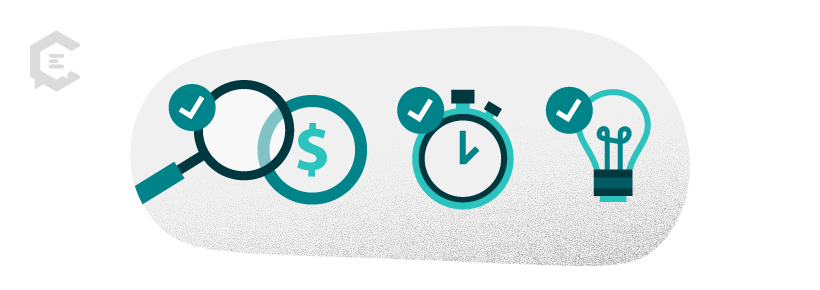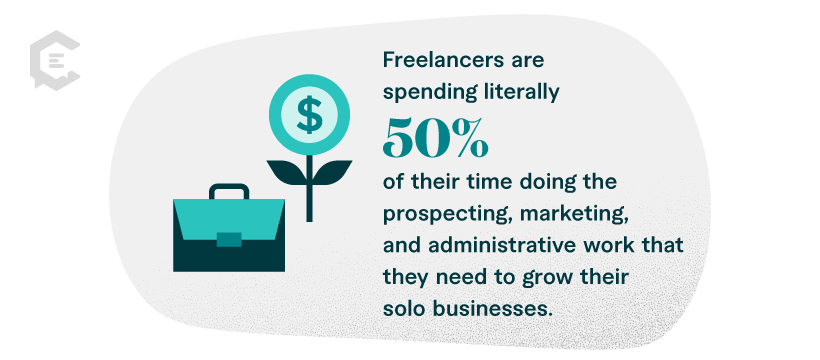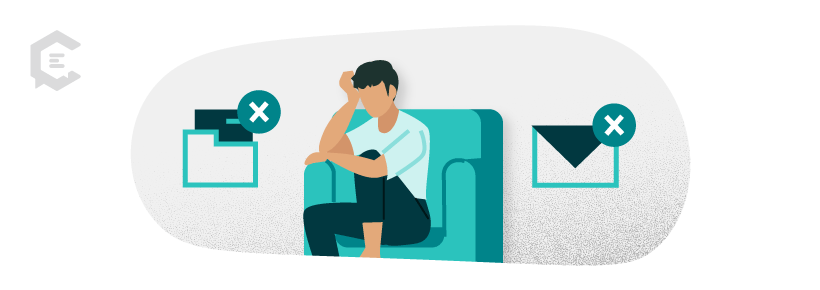Think about back when you were dreaming up your freelance business. Your imagination probably painted an awe-inspiring picture of a life filled with flexibility and freedom.
You saw yourself sitting on a sunny coffee shop patio with your laptop, sipping on a latte while you knocked out your favorite kind of work without anyone telling you what to do and when to do it. You were working less, spending your extra free time hanging out with loved ones, and pursuing passions.
Fast forward a year or two and the reality looks a bit different. You’re working all hours of the day and on the weekends, chained to your stand-up desk. You’re juggling accounting, business development, project management, and deliverables. You’re just getting by financially, and you’re surviving on takeout and copious amounts of caffeine.
Welcome to freelancing! You’ve passed the threshold of being a young, starry-eyed freelancer — and you’re realizing you need to become an entrepreneur. To avoid sabotaging your livelihood and your sanity, you need to manage your freelance business with an entrepreneurial mindset. Follow our tips and tricks in this detailed guide to take the next step and start managing your freelance business like a pro.

Being a Freelancer Means You’re the Boss
“Working freelance” has such a carefree ring to it, and many spirited freelancers get stuck in this carefree mindset and keep things a little too loose. Yes, you are your own boss. But, being the boss is freaking difficult.
Think about the CEO in your past life when you were a salaried employee. Did you like them? Did you roll your eyes when they were absurdly demanding on a Friday afternoon?
“Working freelance” really means “working your ass off.” Because, just like the CEO you used to possibly misjudge, you’re running a business now.
Which means:
- Competition is always right on your heels
- You have to figure out how to balance indescribable highs and lows
- You’ll wear many hats that you don’t want to wear
- You’ll take risks that may or may not work out
- You’ll never stop thinking about your business
In any industry, there are business owners who keep moving forward and those who just don’t make it. Let’s look at some of the do’s and don’ts of managing your freelance business so you can avoid falling into the latter camp.
Top 4 Do’s: How to Successfully Manage Your Freelance Business

1. Do build a cash reserve
Cash flow is one of the most important things you need to master with your freelance business. Employees can get away with living paycheck to paycheck. You can’t. Many of us learned the invaluable lesson of cash reserves when forces beyond our control (ahem, cough, COVID) impacted our freelance businesses, our client’s businesses, and, well… everybody’s businesses.
Building a cash reserve prepares you for unexpected shifts and situations. As a contractor, no matter how incredible your work is, you will be the first on the chopping block when the economy tanks and businesses start downsizing.
Having a reserve allows some breathing room. Plus, when business is going especially well, you can be more choosy about the clients and projects you take on. And don’t let advice like “you need a reserve built up to float you for at least 6-12 months.” That just discouraging and puts extra unneeded pressure at the beginning. Start small and be patient — work toward that one-month milestone and build up from there.
2. Do keep looking ahead
Keep looking ahead with your freelance business, because guess what? Your talented competitors are never far behind, and the gig economy continues to boom. As of this year, there are over 76 million freelancers in the U.S.
Competition is even tougher now. Since remote working in marketing is the new norm, businesses are broadening their geographic reach with full-time employees. Many have been laid off, and they are on the job hunt. Although you once had the upper hand here, now you’re wading through a bigger talent pool.
Looking ahead goes back to building your cash reserves, but also to keeping your pipeline filled at least a quarter ahead. Six months or a year is even better, but more difficult during these times. Keep making time for biz dev, so you don’t finish a project and have nowhere to go.
3. Do track your time all the time
When you’re working on a client project, you diligently track your time using a freelance management tool like Fiverr Workspace to make sure you’re staying within the scope. But what about all of the other tasks you handle?

Caitlin Pearce, executive director of the Freelancer’s Union, shared this humbling data: “Freelancers are spending literally 50 percent of their time doing the prospecting, marketing, and administrative work that they need to grow their solo businesses.”
Tracking admin hours will unveil the true cost of doing business. If you’re considering freelance tools, you’ll make an easy budget decision when you account for the time you’re spending trying to “do it all” versus paying $X per month for an efficient solution.
4. Do an audit and improve business processes
You have a lot to keep up with as a freelancer. It can be very easy to go, go, go, and never stop to audit and improve your business processes. At least once a year, take a step back and uncover opportunities to simplify tasks and save time.
If you follow the previous step and track your time, you’ll quickly identify these areas for improvement. Then, you can find the appropriate solutions.

An important note: find tools dedicated specifically to freelance management, rather than using technology that works for “all businesses.”
Also, you have freelance management tasks that can absolutely be automated, like recurring payments for retainer clients or tracking expenses by importing credit card and bank transactions. Your freelance business is unique, and any technology you bring on should support your specific needs and streamline your operations.
Top 4 Don’ts: How to Unsuccessfully Manage Your Freelance Business

1. Don’t put your business at risk
Anyone who runs a business is a risk-taker. You have to be, otherwise you wouldn’t be here in the first place. Do you know what you would do instead? Take a job where you get a consistent, direct-deposit paycheck.
Think about managing your freelance business as protecting your livelihood. You need contracts that are clear, secure, and easy to execute. You also need to make sure you get paid.
Invoicing should be breezy — as should receiving payments electronically. If you’re waiting around for paper checks in the mail, you’re doing it wrong. If your clients will only pay you by check and they’re always behind with payments, find new clients.
Lastly, don’t put all of your eggs in one basket. Diversify your clients, your business offerings, and your revenue streams.
2. Don’t make proposals an afterthought
Proposals are still a key transactional document. You get a verbal agreement from a new or existing client, and guess what? They want you to whip up that proposal and send it over. If creating proposals is manual and difficult, you’re making life harder than it needs to be.
Automating your proposals allows you to save time and produce the best possible content. Remember that your proposal isn’t just a formality, it’s the way to seal the deal with new business. You want to put your best foot forward, not rush the proposal off in some generic template.
Customize the proposal for your prospect’s goals and requirements. Demonstrate that you are the right partner — and someone who cares about the partnership — by creating high-quality proposals.
3. Don’t work in isolation
Doing everything yourself will only get you so far. You are going to hit walls both creatively and professionally (it’s just part of the gig). It’s hard to be innovative and consistently produce high-quality work when you don’t have additional brainpower to tap into. It’s harder to grow your freelance business when you’re one human that can’t be everywhere at once.
When you partner with other freelancers, you expand your business reach to deliver fresh offerings and innovation to your clients.
Take a website project, for example. If you’re a content creator, you’re able to knock out the messaging and SEO. But, what about the design and UX? You’ll probably end up partnering with your client’s internal team or other freelancers or agencies you don’t know anyway. So embrace working with a freelance partner, build your preferred team, and offer a one-stop solution where you get to work with familiar processes and people.
4. Don’t lose sight of your personal mission.
Your personal mission isn’t like a traditional mission statement about what you do… it’s more about why you’re doing it.
Why are you running this freelance business? Why did you take the risk in the first place? Why do you continue to work hard to keep things going? Your personal mission is what gets you out of bed every day. It may have nothing to do with the type of work you do. It’s more about fulfillment.
Things will inevitably get tough for your freelance business. If you lose sight of your personal mission, it will be that much harder to keep pushing and succeeding.
You’re not an employee anymore… you’re the boss. Your freelance business will be all-consuming if you don’t make this mindset switch. Want to keep doing what you love? Start thinking more like an entrepreneur. You’ll find opportunities to keep your business moving forward, even when the going gets tough.

Finding Fulfillment as a Freelancer
When you embark on the freelancing journey, you’re choosing the non-traditional path. Yes, it’s hard, but it can ultimately lead you to a life full of rewards and fulfillment you would never have with a classic 9 to 5. Ultimately, the core of a freelance career centers around freedom, but here are some other great benefits:
- You can align with your personal values. You get to choose projects that resonate with you, leading to a more enjoyable, motivating, and meaningful day-to-day work experience.
- You can create a more balanced lifestyle. The autonomy of freelancing can allow you to structure your day around when you’re most productive while also prioritizing your well-being.
- You engage with and create a community. As you freelance, you’ll meet other people who’ve followed the same work path as you. You’ll get to connect with them, share experiences, and foster a sense of support and belonging.
- You’re able to pursue continuous growth. Freelancing means you’re embracing lifelong learning. It keeps you malleable as you reflect on your personal and professional growth and refine/set new goals to ensure your career stays fulfilling.
Consider Partnering with a Content Agency
We’ll admit that we think freelancing is one of the most rewarding paths you can take. With the right approach, work ethic, and networking, the sky’s the limit. And sometimes, it helps to have a partner to get you started. That’s why at ClearVoice, we’re extremely proud of the community of freelancers we’ve built. When you join our Talent Network, we’ll match you with top companies that fit your exact skills and expertise to make sure you succeed.



